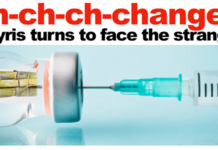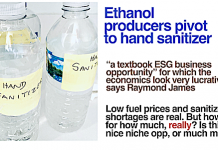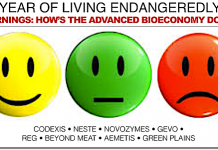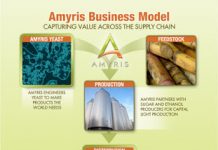Corbion Bids To Acquire TerraVia
In California, Corbion has made a $20M stalking horse stock and asset purchase bid for TerraVia (TRVA).
The purchase agreement provides TerraVia with a binding bid of $20 million in cash along with the assumption of certain liabilities, which is subject to higher or otherwise better offers. As part of the transaction, Corbion will be assuming the ongoing financial obligations of the business and its joint venture ownership, therefore the total financial commitment is expected to be in excess of the cash purchase price. Through this proposed transaction, TerraVia employees, who bring with them a wide range of highly valued skills and expertise, together with its customers, have an opportunity to benefit from joining a global leader in its markets.
The bidding process
To facilitate the bidding process, TerraVia and its wholly owned U.S. subsidiaries have filed Chapter 11 reorganization. Pursuant to section 363 of the Bankruptcy Code, TerraVia intends to implement bidding procedures to allow other qualified bidders the opportunity to submit bids through a court-supervised process to purchase certain or all of the assets being sold. TerraVia anticipates that a sale will be completed within 60 to 90 days.
Interim financing
In addition, TerraVia also announced that it has received a commitment for debtor-in-possession (DIP) financing from holders of approximately 63% of the outstanding principal amount of its senior unsecured convertible notes. The DIP financing will be used to finance the working capital needs of TerraVia’s business through the completion of the sale transaction and to support payments to vendors for post-petition purchases in the ordinary course.
The DIP financing announced today provides the necessary financing to support continued operations and TerraVia’s ability to service customer demand, while the Section 363 bankruptcy restructuring process provides the tools to execute an expedited and orderly strategic transaction. This process will create a level playing field for all interested bidders to compete to provide the highest or otherwise best offer for certain or all of TerraVia’s assets.
The company going forward
The chapter 11 cases and the sale process should have no material impact on TerraVia’s ability to fulfill its obligations to its customers and employees going forward. TerraVia has filed a series of motions with the Bankruptcy Court requesting authority to continue normal operations, including requesting Bankruptcy Court authority to continue paying employee wages and salaries, certain vendors and customer obligations in the ordinary course without interruption.
The Solazyme-TerraVia backstory
“We make oils” said the prospectus for the old Solazyme when it completed its celebrated IPO five years ago, pledging to transform the market for oils through the power of algae to make them. The company subsequently ratcheted its focus down to speciality ingredients and nutrition but that’s been typical of almost every algae-based venture, most of which long abandoned the fuels and big chemicals markets in a search for price points that were more reachable in the near-term.
Solazyme transformed itself far more than others renaming the company and focusing solely on nutrition. That move generally felt like a Hail Mary to raise fresh money when interest in industrials collapsed with the fall of oil prices in 2014-15.
We last looked at TerraVia in depth during April, in our “TerraVia in the Wilderness Years” column. At the time we noted:
How much clock does TerraVia have? With a “going concern” warning and a debt re-org on the menu for this year, it’s far from dire but equally far from “you have lots of time”. TerraVia will have to find it’s mojo soon if it to remain independent, we suspect. 2017 appears to be the year.
The momentum the company is detailing in releases is not yet translating into financial results that’s for sure. The good news? The [most recent quarterly] results were in line with the painful corporate guidance in the Q3 call with investors and analysts. The bad news? The company’s auditors inserted a “going concern” notice into the company’s 2016 annual report.
We also noted:
It’s been rough going for TerraVia in recent weeks. The company announced a painful round of layoffs 25 percent of the company’s workforce, which had already been substantially reduced in the past two years. And the company suspended operations at its Peoria, Illinois demonstration-scale facility, and said it was seeking “strategic opportunities to partner its AlgaVia line of products” which of course could range from a joint venture to an outright sale of the brands (while retaining perhaps a manufacturing contract).
The product portfolio today
The company earlier this year had six active products in “food & nutrition” and one in “speciality ingredients” – the latter generally refers to the AlgaPur range of specialty personal care oils including Capric, Lauric and Oleic-based oils and Unilever is currently AlgaPur high lauric oil in certain of its soap brands.
Two of those products under the AlgaVia brand are in the “seeking partner” shelf at the moment. Leaving the company with its DHA, it’s AlgaWise Omega-9 algae oil, the thrive Culinary Algal Oil (launched in 2015) and the afore-mentioned AlgaWise algae butter.
There is a pipeline of “additional products we expect to launch in the food, nutrition and specialty ingredients markets in 2017 and 2018” and on those really will rest the fate of the company’s painful and wrenching shift of company name from Solazyme to TerraVia. After all, AlgaPur is essentially a carryover from Solazyme days, Thrive was launched during that period as well, and since there are a half-dozen companies at least in the algae space focused on nutritionals without changing identity in many ways it comes down, for now, to AlgaWise butter. That’s been the fruit, so far, of the a titanic identity shift last year and an refocusing of the brand onto nutrition. Butter is a $4.4 billion market and a price point around $4400 per ton, so there’s room for encouragement and that may well be what Corbion sees.
What Corbion is getting
There’s lots for Corbion to like after all, the company is focused on food, biochemicals, bioplastics, and biomedicals so there’s plenty of cross-over, and Corbion has been looking at more advanced technologies. We expect that the TerraVia name will be swiftly retired but some reasonably established brands will go on especially the AlgaPur relationship with Unilever.
Getting in on the auction of the assets
This is a stalking-horse bid for the company the price could go higher and the acquiror could change. We’ll know all within 60 to 90 days. Meanwhile, interested bidders “are encouraged to contact, as soon as practicable” the Rothschild team that’s Nicholas Barnes or Tero Jänne at (212) 403 3500.
Jim LaneJim Lane is editor and publisher of Biofuels Digest where this article was originally published. Biofuels Digest is the most widely read Biofuels daily read by 14,000+ organizations. Subscribe here.








